“After we won that third Super Bowl, it would never have occurred to me that I wouldn’t get another one in the number of years that have passed by.” ~Jerry Wayne
The number is 29. It’s been 29 years since the Cowboys won a Super Bowl. Shoot, it’s been 29 years since the Cowboys so much as won a divisional playoff game.
Episode 7 of the Netflix docuseries, “America’s Team: The Gambler and his Cowboys,” marks the official end of the dynasty. And, I would suggest, the end of the Dallas Cowboys as anybody 40 years old or older knew them.
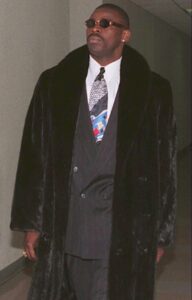 The episode opens with Channel 5’s Marty Griffin’s hidden-camera footage of Michael Irvin buying crack cocaine. I still don’t know how he pulled that off and I’m not sure anything like that could ever happen again. It was so shocking at the time to see and hear Michael on video buying cocaine. And then we move to the drug possession arrest of Irvin and backup tight end Alfredo Roberts and two dancers at that Residence Inn in Irving on March 5, 1996. Netflix interviewed the judge and the assistant District Attorney in the case, and it’s fascinating. The assistant D.A. recalls he couldn’t believe how many strippers he interviewed for the case. They both say the evidence against Michael was “overwhelming.” Irvin was charged with two counts of felony drug possession and faced up to 20-years in prison. To remind the prosecutor exactly who he was, Irvin showed up for the first day of the trial wearing a full length mink coat and sunglasses. Classy. One of the strippers claimed the cocaine was hers, to protect Michael, while another stripper testified against Irvin and spilled the tea on everything. A reporter covering the trial described the witness as “a topless dancer with seemingly bottomless allegations.” Good line. On the second day, the FBI charged in and cleared the courtroom because of a death threat against Michael. One of the stripper’s boyfriends, a City of Dallas police officer who claimed the dancer was his common law wife, was arrested and charged with putting a hit out on Irvin. Seriously. There were also allegations of strip searches and witness tampering. Troy Aikman showed up to offer his support. O.J.’s trial the year before seemed low-key compared to this three-ring circus.
The episode opens with Channel 5’s Marty Griffin’s hidden-camera footage of Michael Irvin buying crack cocaine. I still don’t know how he pulled that off and I’m not sure anything like that could ever happen again. It was so shocking at the time to see and hear Michael on video buying cocaine. And then we move to the drug possession arrest of Irvin and backup tight end Alfredo Roberts and two dancers at that Residence Inn in Irving on March 5, 1996. Netflix interviewed the judge and the assistant District Attorney in the case, and it’s fascinating. The assistant D.A. recalls he couldn’t believe how many strippers he interviewed for the case. They both say the evidence against Michael was “overwhelming.” Irvin was charged with two counts of felony drug possession and faced up to 20-years in prison. To remind the prosecutor exactly who he was, Irvin showed up for the first day of the trial wearing a full length mink coat and sunglasses. Classy. One of the strippers claimed the cocaine was hers, to protect Michael, while another stripper testified against Irvin and spilled the tea on everything. A reporter covering the trial described the witness as “a topless dancer with seemingly bottomless allegations.” Good line. On the second day, the FBI charged in and cleared the courtroom because of a death threat against Michael. One of the stripper’s boyfriends, a City of Dallas police officer who claimed the dancer was his common law wife, was arrested and charged with putting a hit out on Irvin. Seriously. There were also allegations of strip searches and witness tampering. Troy Aikman showed up to offer his support. O.J.’s trial the year before seemed low-key compared to this three-ring circus.
In a shocking move that baffled the judge and the assistant D.A., Irvin’s attorneys worked out a plea bargain with the prosecutor. Michael pled “no contest” and received probation and a $10,000 fine. The assumption is that someone got to the D.A. It seems like the assistant D.A. has still not gotten over it. The harshest penalty was handed down by the NFL: a five game suspension to begin the 1996 season.
Netflix spends a full 25-minutes documenting the details of the sensational trial and all the gory particulars of the Playmaker’s off-the-field misbehavior: drugs, booze, sex parties, strippers, the “White House,” etc., Skip Bayless claims “the whole culture was rotten to its core.” Andrea Kramer, who covered it every day for ESPN, says the Dallas Cowboys were never the same after Irvin’s trial. “It’s the seminal moment,” she says, “when it started to collapse.”
Boy, did it.
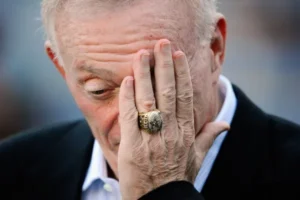 On one hand, the Cowboys were losing good players and coaches to free agency and not replacing them. In the three seasons after Jimmy left, Jerry and Barry lost 31 players to free agency and signed only seven. That’s not going to cut it. The first four post-Jimmy drafts netted a total of one Pro Bowler. Disaster. Troy could tell the owner and the coach didn’t know what they were doing. A still agitated Aikman says, “Jerry was learning the business on my time.”
On one hand, the Cowboys were losing good players and coaches to free agency and not replacing them. In the three seasons after Jimmy left, Jerry and Barry lost 31 players to free agency and signed only seven. That’s not going to cut it. The first four post-Jimmy drafts netted a total of one Pro Bowler. Disaster. Troy could tell the owner and the coach didn’t know what they were doing. A still agitated Aikman says, “Jerry was learning the business on my time.”
The incompetence of the front office to evaluate talent and maintain a championship-caliber team was a major problem (still is). But the off-the-field stuff became absolutely ridiculous. There were league drug suspensions for Leon Lett, Shante Carver, and Clayton Holmes; DUI arrests for Cory Fleming (2) and Erik Williams; Deion got arrested for trespassing while fishing on private property. We were seeing a new Dallas Cowboy mugshot every other day!
This was one of the more glaring differences between Jimmy Johnson and Barry. One can’t imagine Jimmy putting up with all the off-the-field incidents and the distractions they caused. Barry? He never acted like he cared. Pat Summerall quoted Barry as telling him, “I don’t want to know what’s going on.” Barry tells the Netflix crew, “I didn’t pay any attention to it. We had a job to do and, whoever was at practice that day, we’d go out and work and get ready to play the team we gotta play. You think they’d listen to a coach telling them, ‘Hey, don’t do that anymore?’ Nonsense!”
When the Netflix interviewer asks Barry the obvious question, “Did these kinds of things happen when Jimmy was the coach?” Barry responded incredulously. “Are you saying that because I was the head coach this happened? You ain’t gonna put this on me, that it was my fault all this happened, because it isn’t.”
Then then the very next scene is a television newscast reporting that Cowboys coach Barry Switzer has been arrested for having a loaded gun in his carry-on bag at the airport.
Episode 7 chronicles the end of the Dallas Cowboys.
Remember when Irvin stabbed rookie lineman Everett McIver at training camp in 1998? Several players were in line to get haircuts inside a Midwestern State University dorm room, when Irvin walked in and, citing veteran privilege, jumped to the front of the line. McIver took issue and Michael grabbed a pair of scissors and stabbed him in the neck. McIver almost died. And nobody on the Cowboys talked. Not Jerry. Not new coach Chan Gailey. Not any of the players. They called it an accident, horseplay, fooling around. Irvin avoided prison time only because everybody kept their mouths shut. And he knows it. Speaking of McIver, Michael says, “Had he not handled it the way he handled it, I was definitely going to jail.” Netflix did not report how much money McIver was paid for his silence.
The episode covers Irvin’s last game in October 1999 in which he suffered a neck injury that revealed a stenosis in his spine that ended his career. It’s interesting that Michael says if Jimmy and Norv were still coaching, he would have come back. But not for Chan Gailey.
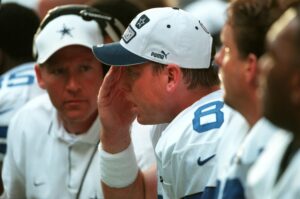 They document the last straw that forced Aikman to walk away in the middle of the 2000 season. It wasn’t so much the concussions he was suffering because the team around him was so bad, it was more that he knew there was no hope. After Washington’s LaVar Arrington knocked Aikman out on that October afternoon, giving him his ninth career concussion, his fourth in 14 months, Aikman says he was mentally and physically exhausted. “There just wasn’t a light at the end of the tunnel,” he remembers. “There was no question who was in charge and I didn’t see anything that was being done that offered any hope.”
They document the last straw that forced Aikman to walk away in the middle of the 2000 season. It wasn’t so much the concussions he was suffering because the team around him was so bad, it was more that he knew there was no hope. After Washington’s LaVar Arrington knocked Aikman out on that October afternoon, giving him his ninth career concussion, his fourth in 14 months, Aikman says he was mentally and physically exhausted. “There just wasn’t a light at the end of the tunnel,” he remembers. “There was no question who was in charge and I didn’t see anything that was being done that offered any hope.”
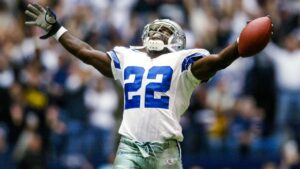 Emmitt Smith held on a little longer, surpassing Walter Payton in a 2002 game against the Seahawks to become the NFL’s all-time leading rusher. I was there at Texas Stadium that day to witness history. Emmitt was 92 yards away from Payton’s 16,726; he needed 93 yards to pass him. The Cowboys’ next two games were on the road; the Cowboys wanted him to break the record at home. So did Emmitt. And he did. It was the only time I’ve ever seen a press box full of announcers and reporters give anybody a standing ovation. It was beautiful. They stopped the game to give Emmitt the ball and to unveil a banner from the rafters at Texas Stadium. Payton’s family was there for the celebration and speeches afterward. The networks all offered extensive coverage of what was a national event. The Seahawks won the game and the Cowboys dropped to 3-5 on what would be a 5-11 season, the last of Dave Campo’s three straight 5-11 seasons. I remember interviewing Seattle coach Mike Holmgren in the visitors locker room afterward. I’ll never forget what he said about Emmitt’s record: “The Cowboys got what they wanted and we got what we wanted.”
Emmitt Smith held on a little longer, surpassing Walter Payton in a 2002 game against the Seahawks to become the NFL’s all-time leading rusher. I was there at Texas Stadium that day to witness history. Emmitt was 92 yards away from Payton’s 16,726; he needed 93 yards to pass him. The Cowboys’ next two games were on the road; the Cowboys wanted him to break the record at home. So did Emmitt. And he did. It was the only time I’ve ever seen a press box full of announcers and reporters give anybody a standing ovation. It was beautiful. They stopped the game to give Emmitt the ball and to unveil a banner from the rafters at Texas Stadium. Payton’s family was there for the celebration and speeches afterward. The networks all offered extensive coverage of what was a national event. The Seahawks won the game and the Cowboys dropped to 3-5 on what would be a 5-11 season, the last of Dave Campo’s three straight 5-11 seasons. I remember interviewing Seattle coach Mike Holmgren in the visitors locker room afterward. I’ll never forget what he said about Emmitt’s record: “The Cowboys got what they wanted and we got what we wanted.”
Fitting. Poignant. What Jerry wants, the “other things,” don’t necessarily have anything to do with winning football games.
Peace,
Allan
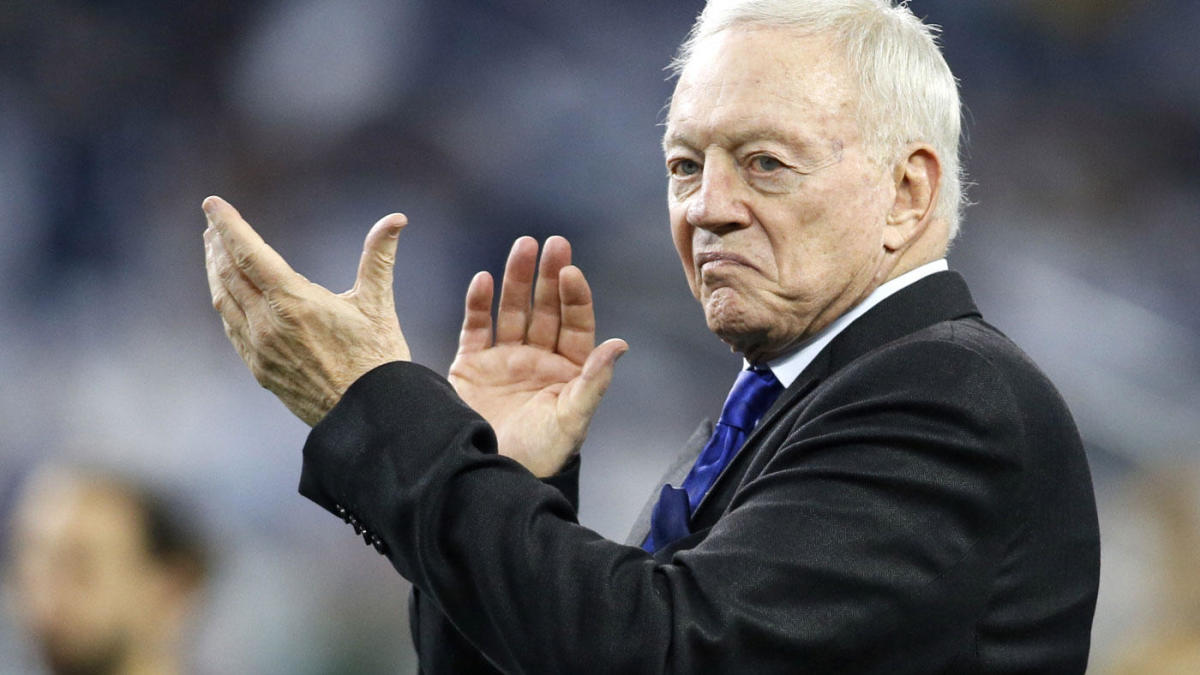
Leave a Reply